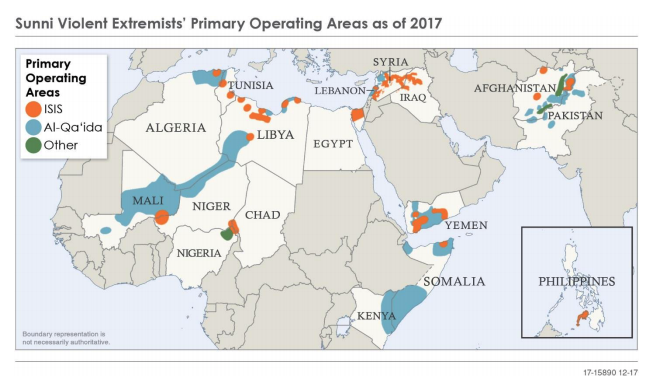 On January 19, the Pentagon released its new National Defense Strategy. The second paragraph of the 14-page declassified summary painted a dire picture. “Today, we are emerging from a period of strategic atrophy, aware that our competitive military advantage has been eroding,” the Defense Department warned. “We are facing increased global disorder, characterized by decline in the long-standing rules-based international order—creating a security environment more complex and volatile than any we have experienced in recent memory. Inter-state strategic competition, not terrorism, is now the primary concern in U.S. national security.”
On January 19, the Pentagon released its new National Defense Strategy. The second paragraph of the 14-page declassified summary painted a dire picture. “Today, we are emerging from a period of strategic atrophy, aware that our competitive military advantage has been eroding,” the Defense Department warned. “We are facing increased global disorder, characterized by decline in the long-standing rules-based international order—creating a security environment more complex and volatile than any we have experienced in recent memory. Inter-state strategic competition, not terrorism, is now the primary concern in U.S. national security.”That last line garnered widespread attention. It signaled that defense planners no longer want the jihadist wars unleashed by the 9/11 attacks to be their primary focus. The rest of the overview explained why. China is now a “strategic competitor,” while Russia seeks to “shatter the North Atlantic Treaty Organization and change European and Middle East security and economic structures to its favor.” Both China and Russia “want to shape a world consistent with their authoritarian model—gaining veto authority over other nations’ economic, diplomatic, and security decisions.” Meanwhile, rogue states such as North Korea and Iran increasingly pose threats to American interests. While the Defense Department recognizes that ISIS and other “terrorist groups” will continue “to murder the innocent and threaten peace more broadly,” Washington must shift its focus to “long-term strategic competition.”
In many ways, the Pentagon’s planning document makes sense. China and Russia command resources that far outstrip the jihadists’ capabilities. They have nuclear-tipped missiles; the jihadists do not. The gap between their conventional military prowess and America’s has closed somewhat. Russia and China also use other means, ranging from economic pressure to cyberattacks to espionage and disinformation, to challenge American supremacy. Meanwhile, the 9/11 wars have been costly. But as threatening as they’ve been, the jihadists lack the industrial capacity and military might to be a top-tier competitor. It is only natural, given these facts, that the Defense Department seeks a rebalancing.
It will not be so easy, though, to pivot away from the jihadists. ISIS and al Qaeda have tied up security services throughout the West for years. Thousands of terror suspects across Europe require monitoring. The FBI has been swamped by hundreds of U.S. cases involving potential terrorists. The CIA and allied intelligence agencies continue to hunt down professional terrorists who plot mass destruction in the West. ISIS and al Qaeda operatives still threaten aviation with smartly concealed bombs. And while ISIS has lost its territorial caliphate, the fight is far from over.
This past week, the Office of the Director of National Intelligence (ODNI) presented its annual worldwide threat assessment to the Senate. It contains numerous warnings that the Defense Department pivot may be premature: “Over the next year, we expect that ISIS is likely to focus on regrouping in Iraq and Syria, enhancing its global presence, championing its cause, planning international attacks, and encouraging its members and sympathizers to attack in their home countries.” ISIS, the ODNI assessment warns, “has started—and probably will maintain—a robust insurgency in Iraq and Syria as part of a long-term strategy to ultimately enable the reemergence of its so-called caliphate,” and it will continue to “threaten U.S. interests in the region.”
The bottom line: ISIS is far from finished. While most of the territory once under its rule in Iraq and Syria has been “liberated,” the group still retains the resources to wage guerrilla warfare indefinitely.